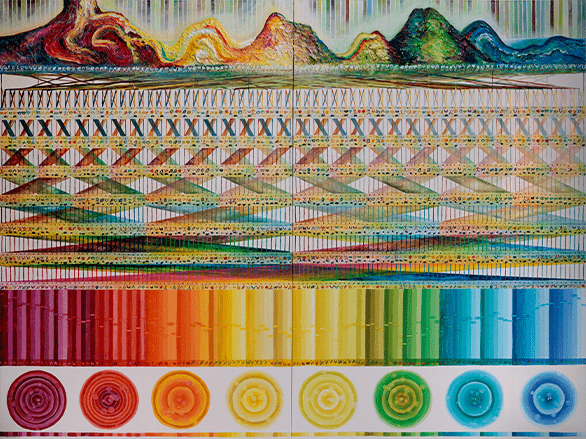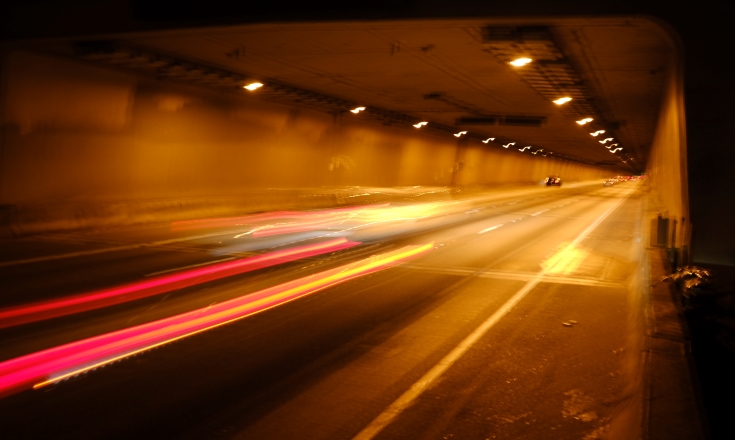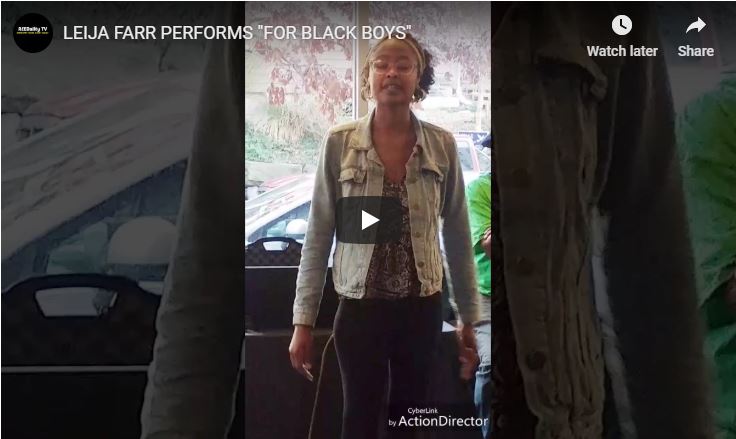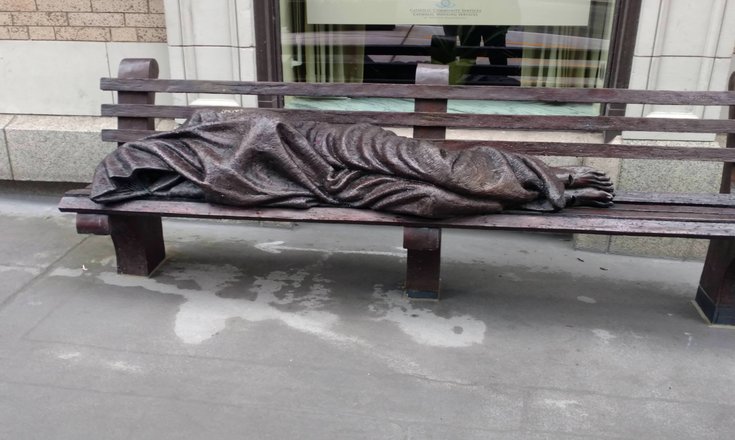Lush Computation: bridging the gap between technology and humanity through art, M. Rosetta Hunter Gallery’s Fall show
Seattle Central College’s M. Rosetta Hunter Gallery is set to host an exhibition that transcends the boundaries of art, technology, and humanity. Or, rather, connects them.
Titled “Lush Computation” and curated by Meghan Elizabeth Trainor, the exhibit showcases a profound exploration of the intersection between digital and computational technology and its deeply human aspects through artistic expression.
“This show is fundamentally about remaining empowered in the face of technology,” says Trainor. Featuring the works of acclaimed artists Edgar Fabián Frías, Pepper Pepper, Juliet Fiss, and THEYDRIFT, the show explores the intricate threads that bind the realms of technology and art, both essentially human, with media that vary from video monitors to paintings to textile installations.
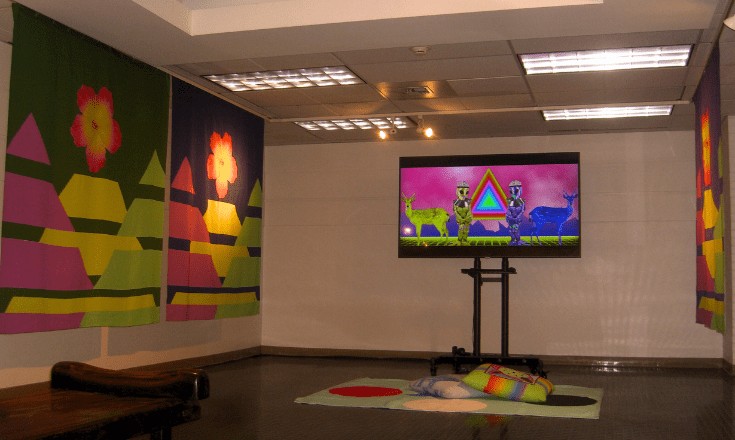
In this show, Trainor wanted to “subtweet the AI debate,” where she thinks there’s necessary concern. But coming from a new media background, she says there are artists like Fiss, a Computer Science PhD, doing lots of digital artwork that aren’t in competition with AI at all.
“She can see the beauty in algorithms,” Trainor said. “Someone might come into this gallery and be really comfortable with painting as a discipline and see this beautiful painting. Even if they feel like, ‘oh I don’t understand the minutia of algorithms,’ they can get a lot out of this painting compositionally. These artists are coming from a very personal place. You’re not confusing these artists for each other.”
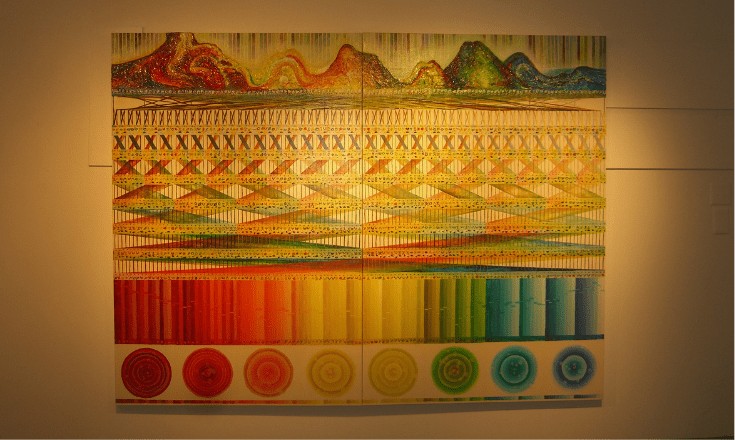
In regards to the artists featured in the show, Trainor says that “THEYDRIFT is a street artist. He does lots and lots of portraiture of rappers, and other artists like Salvador Dali or Frida Kahlo.
“I was really attracted to a painting he did that I saw down at the Cherry Pit,” Trainor said. “I love the DIY local small galleries, the house galleries. He did a piece that was a portrait of MF Doom and it had been chopped up. He digitally chopped up the image and then painted it. So it’s kind of this inverse where he’s taking digital processes but pulling them back out into painting. I’m excited to have his work in the show.”

“And then we get to Pepper Pepper’s work, who is a really well-known drag performer, particularly in Portland,” continues Trainor “This piece, this four-channel digital installation, Pink Moment, it looks as if it’s algorithmically generated. It looks like something a computer has made, and he did it all by hand. He removed his body, and then he split the screen. So you have this beautiful undulating shape that is, in essence, a drag performance without a body, which there’s so much to say about. And I will let Pepper be the one to talk about it. But he said that he edited it all by sound. All of the talking is just him listening to the sound of the wind,” explains Meghan about another in the show, which you can see as soon as you walk in, displayed on four monitors and accompanied by sound. “You have these four channels, you just start them up and they go, and you get these patterns [that] emerge from these four channels that are slightly out of sync. This is someone who lives in a world of digitally created patterns, but is hand-making something that has that. So it’s an aesthetic. He’s pulled that aesthetic into handicraft as an artist.”
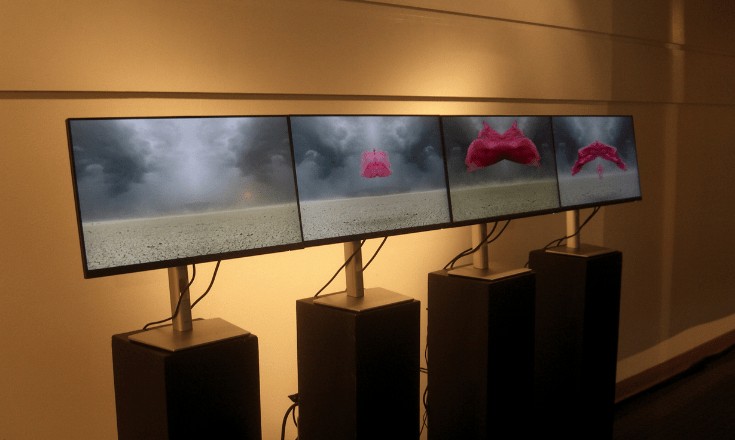
“Edgar Fabian, who showed here last year as part of Viva La Comunidad,” continues Trainor, “creates these environments that are supersaturated with positive energy and bright lights and a very contemporary digital palette. But you’re sitting on the ground on a cushion, right? And so that is the thing that especially resonates with me, is when we’re bridging digital space and physical space. There’s not this ‘either or,’ we’re just kind of in a wave of human and computer.”
Tying the message of the show to its title, Trainor explained that Lush Computation is about a lush expression.
“The show is very bright, it’s very colorful. You walk in, even though it’s a little dim, everything seems to be pink and blue.”
“I think, again, there’s spaces of really important critique of digital systems, of algorithms, of AI. And I think that so much of technology is paired with late capitalism. So we see technology exclusively as a tool of that system. And what I hope this show does, and what inspires a lot of my own work, is decoupling technology from those spaces that are not under our jurisdiction.”
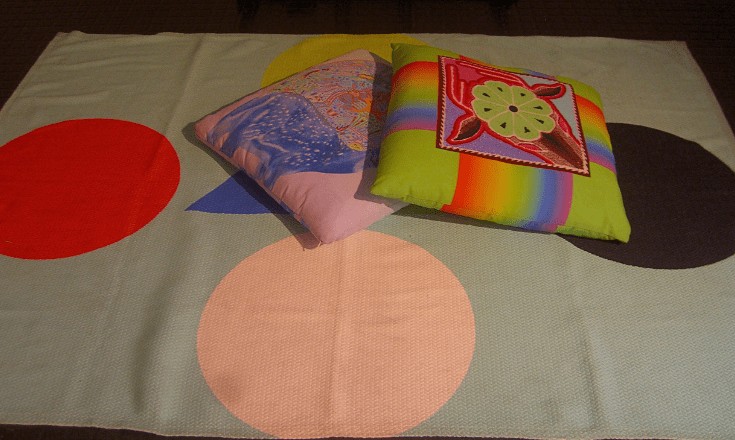
When we return to the topic of M. Rosetta Hunter Gallery as a space that belongs to, and serves, our community, Trainor says “Here’s a space where we can be authentically human, we can be ourselves, we are in control of how we’re using, and that’s why I use that phrase, the use and non-use of technology. So just like as Pepper [Pepper] is making decisions about, ‘I’m going to hand edit this thing,’ or Julia is like, ‘I’m going to make a painting to describe an algorithm,’ that sense of humanness, that sense of empowered individual humanness in the face of massive systems of surveillance technology that we are embedded in that are hugely problematic.”
Trainor hopes all kinds of students will feel drawn to the show.
“Maybe you’re a STEM student, you’re a math student, and you’re like, ‘hey, I know exactly what a fast Fourier transform is’, or ‘I’m a computer science student, and [the show] is there for me, it’s speaking my language.’ Or maybe you come in and you say, hey, I’m really into street art and hip-hop, and I see that Nas’ Illmatic is like the greatest album of all time’ I don’t know, fight me. But, so you see the reflection of that culture. Maybe you’re someone who is in drag culture, and you see a poetic version of drag. I mean, it’s like high poetry for drag. Maybe you’re someone who’s active in indigenous cultural practice. And so Edgar [Fabián Frías]’s practice speaks to that a little less directly in this piece, but overall their work is reflecting their heritage. So I think the diversity of the show speaks to all the ways that we can find ourselves in art and in the use of technology.”
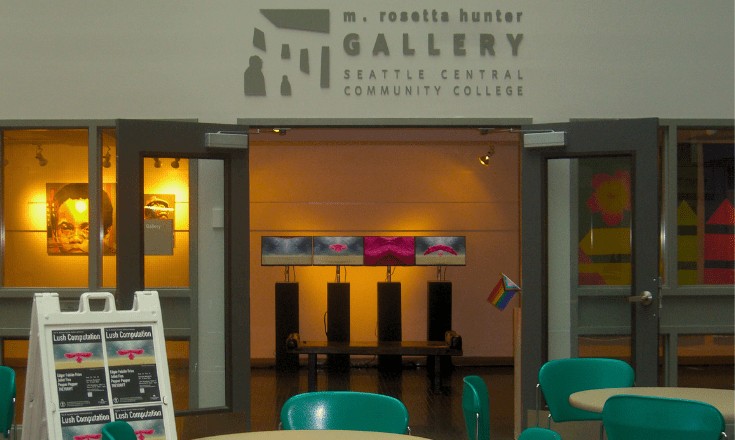
Trainor finished by saying “I want students to come in here and say, ‘this part resonates with me and maybe this part I don’t understand as much, but I’m drawn in by the part that I do resonate with.’ And maybe, you know, maybe it’s something as simple as ‘I really like these colors, or ‘I like the sound of the wind,’ or ‘I just like having a quiet place to sit down on the floor and watch a beautiful video when I’m having a long, hard day at school.”
Lush Computational’s opening party will take place on Thursday, October 12, from 4-7pm, where the artists and curator can be met alongside refreshments and music. Located in the Atrium, inside Seattle Central’s Broadway building, the gallery is open Monday through Thursday, from 10am to 3pm. All are welcome, and admission is free, always.

Sophia is an internationally published author with her book Primeira Pessoa, as well as a young classical singer. Born and raised in Brazil, she believes the greatest role of a writer is to bring forth the truth, the honesty, and the humanity that echoes within each one of us.

